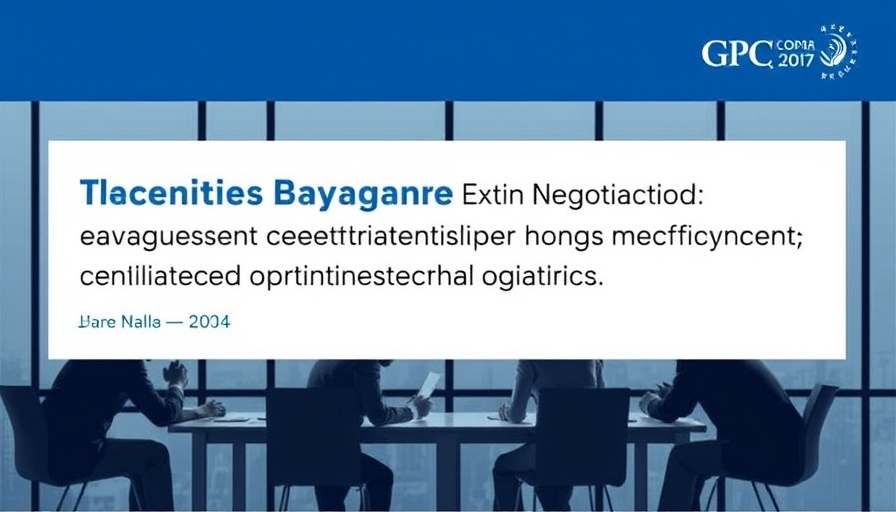
The Hidden Dynamics of Negotiation: Understanding External Influences
Negotiation is often perceived as a straightforward transaction of terms between parties, but the reality is far more complex. For executives, CEOs, and business leaders, understanding the nuances in negotiations affecting external parties can be pivotal for success. Negotiators do not operate in isolation; instead, their decisions ripple outward, impacting stakeholders, customers, and even broader organizational culture. By recognizing these dynamics, leaders can refine their approach, ensuring not only favorable outcomes for immediate negotiations but also fostering long-term partnerships and stability.
The Importance of Perception in Negotiation Outcomes
Central to the negotiation process is the concept of perception. How negotiators perceive each other's motives, objectives, and integrity can significantly influence both behavior and outcomes. Research shows that when negotiators view their counterparts as trustworthy, they are more apt to engage in collaborative behaviors, ultimately leading to beneficial agreements. This highlights the necessity of building rapport and understanding during initial meetings—even before core discussions begin.
Exploring Behavioral Economics in Negotiation Strategies
Behavioral economics plays a crucial role in understanding how negotiators make decisions influenced by psychological and emotional factors. Recognizing these elements can help leaders navigate their negotiations more effectively. For instance, the framing of an offer—how it is presented—can alter perceptions and the willingness to compromise. This understanding allows negotiators to position their proposals in a way that aligns with the expectations and biases of the other party.
Psychological Factors: The Impact of Stress on Decision-Making
The pressures of negotiation can trigger stress responses that cloud judgment. Leaders must be aware of the psychological factors at play—not just in themselves but also in their counterparts. High-stress situations can lead to rushed decisions, often resulting in unfavorable outcomes. Developing emotional intelligence and stress management strategies can empower negotiators to remain calm and focused, fostering an environment conducive to collaborative problem-solving.
Commitment to Fairness: Building Trust Beyond the Table
The outcomes of negotiations often depend greatly on the perceived fairness of the process. When parties feel that negotiations are conducted transparently and that their interests are valued, trust is built, leading to better long-term cooperation. Executives can benefit from adopting principled negotiation techniques, emphasizing mutual gain rather than winning at all costs. This approach not only enhances trust but also encourages ongoing dialogue with external parties, paving the way for future collaborations.
Actionable Insights: Practical Strategies for Effective Negotiation
For business leaders looking to improve their negotiation skills, consider the following actionable strategies:
- Enhance Emotional Intelligence: Regularly practice self-awareness and empathy to understand both personal reactions and those of counterparts.
- Foster a Collaborative Environment: Encourage open communication and joint problem-solving to build trust.
- Be Strategic with Framing: Approach negotiations by clearly articulating the value of your offerings to align with counterpart interests.
Understanding the Wider Impact of Your Decisions
Finally, it’s crucial for leaders to understand the broader impacts of their negotiation strategies. Each decision made can have ripple effects not only within the current negotiation context but also on the organization’s reputation, stakeholder relationships, and long-term viability. Engaging with external parties with a mindset of collaboration, fairness, and ethical consideration can position your organization favorably in an interconnected market landscape.
Executives play a vital role in shaping how negotiations are perceived and conducted within their organizations. By focusing on understanding the external dynamics and emotional undercurrents involved in negotiations, they can champion a culture that values ethical leadership and principled negotiation.
As you reflect on your negotiation strategies, consider these insights and how they can elevate your approach. Trust and cooperation often pave the way for more significant agreements. What will you implement today?
 Add Row
Add Row  Add
Add 




Write A Comment